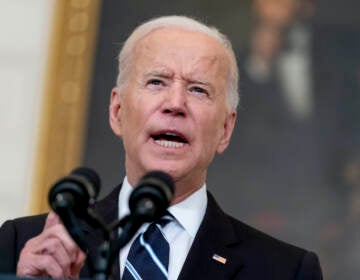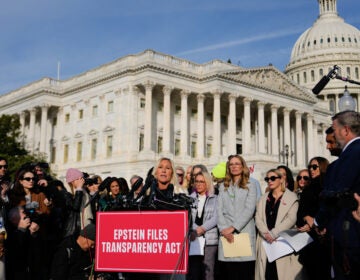House Dems begin moving parts of Biden $3.5T domestic plans
Democrats are starting to push plans for providing paid family and medical leave, easing climate change, and bolstering education through House committees.

Rep. Lloyd Smucker, R-Pa., listens as the tax-writing House Ways and Means Committee holds a markup hearing to craft the Democrats' Build Back Better Act. (AP Photo/J. Scott Applewhite)
House Democrats began pushing plans for providing paid family and medical leave, easing climate change, and bolstering education through House committees Thursday as they battled Republicans and among themselves over President Joe Biden’s $3.5 trillion vision for reshaping federal priorities.
Five committees worked on their slices of the 10-year proposal, early steps in what looms as a fraught autumn for Democrats hoping to enact a remarkable range of major policy changes. They face not only solid GOP opposition but internal divisions among progressives and moderates in a Congress they control so narrowly that they can afford only three House defections, none in the Senate.
“We have a once-in-a-generation chance to make transformative, beneficial change,” said House Ways and Means Committee Chairman Richard Neal, D-Mass., as his tax-writing panel debated its pivotal chunk of the voluminous legislation. “This is our moment to lay a new foundation of opportunity for the American people.”
Republicans cast the still-evolving measure as an economy killer that would raise taxes, cost jobs, worsen federal debt and make people increasingly reliant on government. In a signal of the broad political potency they believe the chaotic U.S. withdrawal from Afghanistan offers, they repeatedly conjured that image to belittle Democrats’ economic plans.
“Following the humiliating Afghanistan surrender, now President Biden is leading America on an economic surrender to China, Russia, Europe, and the Middle East,” said the top Republican on Ways and Means, Rep. Kevin Brady of Texas.
At a sixth committee, Democrats controlling the House Energy and Commerce panel unveiled new details supporting Biden’s push to wean power plants off climate-damaging fossil fuels by 2035. That included $150 billion in grants for utilities investing in cleaner energy sources plus millions of dollars in penalties for companies that don’t boost clean electricity output by at least 4% annually.
They also released their blueprint for retooling Medicare, Medicaid, children’s health insurance, and the 2010 health care law. There were few surprises, but the proposals, which face votes next week, underscored Democrats’ intent to reinforce the pillars of the nation’s health care system with new benefits, lower costs, and expanded insurance coverage.
In an early manifestation of unrest, one Democrat on the Ways and Means panel voted against the first two sections of her party’s bill after complaining that lawmakers lacked information on its cost and hadn’t been shown key portions dealing with taxes and prescription drug prices.
Moderate Rep. Stephanie Murphy, D-Fla., is co-chair of the House Blue Dog Coalition, a centrist group whose members include some of Congress’ most conservative Democrats. On one of those votes, outgoing moderate Rep. Ron Kind, D-Wis., joined her in voting “no.”
“I don’t know how much we’re spending, how much we’re raising, how we’re spending some of the money, and how we’re raising any of the money,” Murphy told her colleagues.
Democrats have said they will pay for much of the overall bill by raising taxes on the rich and corporations. They’ve said no one earning under $400,000 annually would face higher levies.
By Thursday afternoon Neal had not released details of any revenue proposals, including the tax boosts or some tax cuts his party wants to use to help ease people’s costs for health care and other needs.
Also not provided were Neal’s plans to let Medicare save money by negotiating prices they pay for prescription drugs, another way they hope to raise money for the bill’s priorities.
Moderate Democrats — most prominently Sens. Joe Manchin of West Virginia and Kyrsten Sinema of Arizona — have said the bill’s proposed $3.5 trillion cost is too high. Congressional Democratic leaders have conceded that the price tag may have to fall to retain moderate votes, causing anger among progressives who want the package to spend as much as possible.
House and Senate Democrats also must still reach agreements on many issues, including key questions about overall spending and revenues. Democrats in the more moderate Senate have been concerned about the price tags of some House spending proposals.
The Ways and Means portion of the measure is to contain many of Biden’s top priorities. These include creation of up to 12 weeks per year of family and medical leave for all workers beginning in 2023. The benefit would pay the lowest-earning workers up to 85% of their wages, a percentage that would fall for higher earners.
Democrats on the committee batted down Republican amendments. One by Rep. Mike Kelly, R-Pa., would have delayed the paid leave program from taking effect until six months after the Treasury Department would certify that the government had enough expertise to start it.
The Energy and Commerce panel would limit price increases for medications. It would roughly halve Biden’s request for $400 billion to expand home and community-based long-term care services, an apparent bow to constraints Democrats face to live within their self-imposed $3.5 trillion price tag.
Funding for the Children’s Health Insurance Program, which covers nearly 10 million kids, would be made permanent. And money would be provided to cover 4 million low-income adults in states that have not expanded their Medicaid programs.
Energy and Commerce would also spend billions to upgrade the power grid, create an electric vehicle charging network, replace lead drinking water pipes and help minority communities most affected by pollution and climate change.
Separately, the House Education and Labor Committee worked on a proposed $761 billion to create free pre-school and community college and increase funds for job training, nutrition programs, and modernizing public school buildings.
The House Natural Resources Committee was working on $30 billion for addressing climate change and other environmental issues. This includes money to protect coastlines from rising seas and create Biden’s proposed Civilian Climate Corps, which would employ hundreds of thousands of people on environmental projects.
Other panels were working on provisions for small business and science programs.
Top Democrats want to quickly assemble the overall bill, which 13 House committees are crafting, by late September in hopes of moving it through the full House and Senate. That may well prove overly ambitious.

Get daily updates from WHYY News!
WHYY is your source for fact-based, in-depth journalism and information. As a nonprofit organization, we rely on financial support from readers like you. Please give today.






